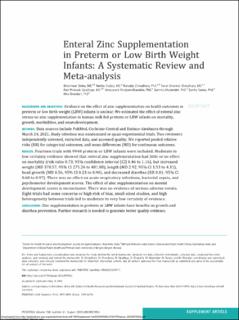Enteral Zinc Supplementation in Preterm or Low Birth Weight Infants: A Systematic Review and Meta-analysis
Sinha, Bireshwar; Dudeja, Nonita; Chowdhury, Ranadip; Choudhary, Tarun Shankar; Upadhyay, Ravi Prakash; Rongsen-Chandola, Temsunaro; Mazumder, Sarmila; Taneja, Sunita; Bhandari, Nita
Journal article, Peer reviewed
Published version

Åpne
Permanent lenke
https://hdl.handle.net/11250/3063494Utgivelsesdato
2022Metadata
Vis full innførselSamlinger
Sammendrag
BACKGROUND AND OBJECTIVES
Evidence on the effect of zinc supplementation on health outcomes in preterm or low birth weight (LBW) infants is unclear. We estimated the effect of enteral zinc versus no zinc supplementation in human milk fed preterm or LBW infants on mortality, growth, morbidities, and neurodevelopment.
METHODS
Data sources include PubMed, Cochrane Central and Embase databases through March 24, 2021. Study selection was randomized or quazi-experimental trials. Two reviewers independently screened, extracted data, and assessed quality. We reported pooled relative risks (RR) for categorical outcomes, and mean differences (MD) for continuous outcomes.
RESULTS
Fourteen trials with 9940 preterm or LBW infants were included. Moderate to low certainty evidence showed that enteral zinc supplementation had little or no effect on mortality (risk ratio 0.73, 95% confidence interval [CI] 0.46 to 1.16), but increased weight (MD 378.57, 95% CI 275.26 to 481.88), length (MD 2.92, 95% CI 1.53 to 4.31), head growth (MD 0.56, 95% CI 0.23 to 0.90), and decreased diarrhea (RR 0.81; 95% CI 0.68 to 0.97). There was no effect on acute respiratory infections, bacterial sepsis, and psychomotor development scores. The effect of zinc supplementation on mental development scores is inconclusive. There was no evidence of serious adverse events. Eight trials had some concerns or high risk of bias, small-sized studies, and high heterogeneity between trials led to moderate to very low certainty of evidence.
CONCLUSIONS
Zinc supplementation in preterm or LBW infants have benefits on growth and diarrhea prevention. Further research is needed to generate better quality evidence.
